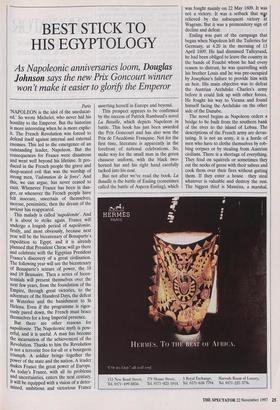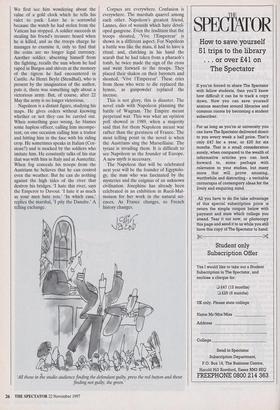BEST STICK TO HIS EGYPTOLOGY
As Napoleonic anniversaries loom, Douglas Johnson says the new Prix Goncourt winner
won't make it easier to glorify the Emperor
Paris `NAPOLEON is the idol of the uneducat- ed.' So wrote Michelet, who never hid his hostility to the Emperor. But the historian is more interesting when he is more explic- it. The French Revolution was forced to defend itself against internal and external enemies. This led to the emergence of an outstanding leader, Napoleon. But the consequences for France were disastrous and went well beyond his lifetime. It pro- duced in the French people the grave and deep-seated evil that was the worship of strong men, Tadoration de la force'. And this, we can argue, has never ceased to exist. Whenever France has been in dan- ger, or whenever the French people have felt insecure, uncertain of themselves, morose, pessimistic, then the dream of the saviour has reappeared. This malady is called `napoleonite'. And it is about to strike again. France will undergo a longish period of napoleonite, firstly, and most obviously, because next year will be the bicentenary of Bonaparte's expedition to Egypt, and it is already Planned that President Chirac will go there and celebrate with the Egyptian President France's discovery of a great civilisation. The following year will see the bicentenary of Bonaparte's seizure of power, the 18 and 19 Brumaire. Then a series of bicen- tennials will present themselves over the next few years, from the foundation of the Empire, through great victories, to the adventure of the Hundred Days, the defeat at Waterloo and the banishment to St Helena. Even if the programme is rigor- ously pared down, the French must brace themselves for a long Imperial presence.
But there are other reasons for napoleonite. The Napoleonic myth is pow- erful, and it is useful. A man has become the incarnation of the achievement of the Revolution. Thanks to him the Revolution is not a terrorist free-for-all or a bourgeois triumph. A soldier brings together the Power of the state and the nation. A leader Makes France the great power of Europe. As today's France, with all its problems and uncertainties, enters the next century, it will be equipped with a vision of a deter- mined, ambitious and victorious France asserting herself in Europe and beyond.
This prospect appears to be confirmed by the success of Patrick Rambaud's novel La Bataille, which depicts Napoleon in battle. This book has just been awarded the Prix Goncourt and has also won the Prix de l'Acadernie Francaise. Not for the first time, literature is apparently in the forefront of national celebrations. So, make way for the small man in the green chasseur uniform, with the black two- horned hat and his right hand carefully tucked into his coat.
But not after we've read the book. La Bataille is the battle of Essling (sometimes called the battle of Aspern-Essling), which was fought mainly on 22 May 1809. It was not a victory. It was a setback that was relieved by the subsequent victory at Wagram. But it was a premonitory sign of decline and defeat.
Essling was part of the campaign that began when Napoleon left the Tuileries for Germany, at 4.20 in the morning of 13 April 1809. He had dismissed Talleyrand, he had been obliged to leave the country in the hands of Fouche whom he had every reason to distrust, he was quarrelling with his brother Louis and he was pre-occupied by Josephine's failure to provide him with an heir. His main objective was to defeat the Austrian Archduke Charles's army before it could link up with other forces. He fought his way to Vienna and found himself facing the Archduke on the other side of the Danube.
The novel begins as Napoleon orders a bridge to be built from the southern bank of the river to the island of Lobau. The descriptions of the French army are devas- tating. It is not an army, it is a horde of men who have to clothe themselves by rob- bing corpses or by stealing from Austrian civilians. There is a shortage of everything. They feed on squirrels or sometimes they cut the necks of geese with their sabres and cook them over their fires without gutting them. If they enter a house they steal whatever is valuable and destroy the rest. The biggest thief is Massona, a marshal. We first see him wondering about the value of a gold clock which he tells his valet to pack. Later he is sorrowful because the watch he had stolen from the Vatican has stopped. A soldier succeeds in stealing his friend's treasure hoard when he is killed, and as the troops charge he manages to examine it, only to find that the coins are no longer legal currency. Another soldier, absenting himself from the fighting, recalls the nun whom he had raped in Burgos and shivers at the memory of the tigress he had encountered in Castile. As Henri Beyle (Stendhal), who is present by the imagination of the author, puts it, there was something ugly about a victorious army. But, of course, after 22 May the army is no longer victorious.
Napoleon is a distant figure, studying his maps. He gives orders without knowing whether or not they can be carried out. When something goes wrong, he blames some hapless officer, calling him incompe- tent, on one occasion calling him a traitor and hitting him in the face with his riding crop. He sometimes speaks in Italian (Cor- sican?) and is mocked by the soldiers who imitate him. He constantly talks of his star that was with him in Italy and at Austerlitz. When fog conceals his troops from the Austrians he believes that he can control even the weather. But he can do nothing against the high tides of the river that destroy his bridges. 'I hate this river, says the Emperor to Davout. 'I hate it as much as your men hate you.' In which case,' replies the marshal, 'I pity the Danube.' A telling exchange. Corpses are everywhere. Confusion is everywhere. The marshals quarrel among each other. Napoleon's greatest friend, Lannes, dies of wounds which have devel- oped gangrene. Even the tradition that the troops shouted, Wive l'Empereur' is shown in a different aspect. For Napoleon a battle was like the mass, it had to have a ritual; and, clutching in his hand the scarab that he had taken from a pharaoh's tomb, he twice made the sign of the cross and went forward to the troops. They placed their shakos on their bayonets and shouted, Wive l'Empereur'. These cries from those who were to die replaced the hymns, as gunpowder replaced the incense.
This is not glory, this is disaster. The novel ends with Napoleon planning the battle of Wagram. The Empire meant perpetual war. This was what an opinion poll showed in 1989, when a majority said that for them Napoleon meant war rather than the greatness of France. The most telling point in the novel is when the Austrians sing the Marseillaise. The tyrant is invading them. It is difficult to see Napoleon as the founder of Europe. A new myth is necessary.
The Napoleon that will be celebrated next year will be the founder of Egyptolo- gy, the man who was fascinated by the mysteries and the enigmas of an unknown civilisation. Josephine has already been celebrated in an exhibition in Rueil-Mal- maison for her work in the natural sci- ences. As France changes, so French history changes.
All those in the studio audience finding the defendant guilty, press the red button and those finding not guilty, the green.'



















































































 Previous page
Previous page